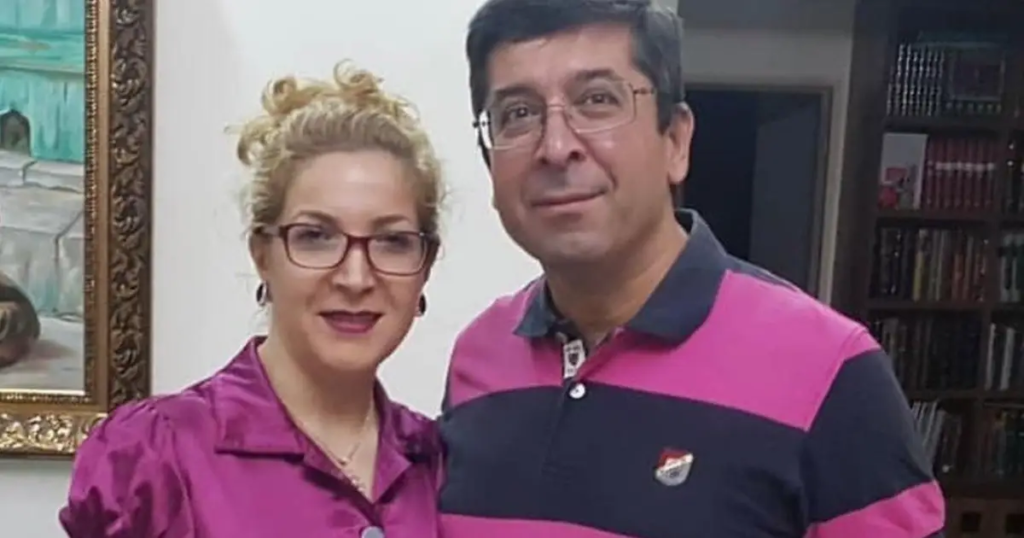Farzaneh Karahasanloo, who is imprisoned in connection with Iran's 2022 protests, has completely lost feeling in the left side of her body and is being denied urgent and proper medical care, Iran International quoted sources as saying.
Sources close to her case described dire conditions in Mashhad's Vakil Abad prison where she is being held, and she is being denied adequate medical care despite her requests for medical attention.
Medical staff at the facility have reportedly only prescribed painkillers without examining the inmates, and they have been denied medical treatment outside the prison.
The source also expressed concern about the health of Fatemeh Sepehri and other political prisoners in the facility, claiming that they are not being properly nourished and are becoming increasingly weak and malnourished. Fatemeh Sepehri, who has been imprisoned since the nationwide protests, has undergone multiple surgeries, including open heart surgery, but remains incarcerated.
In March, Farzaneh Karahasanloo's lawyer, Mohsen Bayat, told Shargh News that he had been banned from making phone calls for two weeks and meeting people for three months after sending a voice message wishing the Iranian people a Happy New Year.
In an audio message published on social media, Karahasanloo primarily sent her best wishes to “parents separated from their children” and “those who support prisoners in Iran and abroad”, and also expressed love for her children who have been “unjustly separated from their parents” for the past 18 months.
Karahassanloo, a medical technician, and her husband, Dr. Hamid Karahassanloo, a radiologist, were arrested in November 2022 during protests in Karaj, near Tehran, where Ruhollah Ajamian, a member of the Basij militia, was beaten to death by angry protesters. Both men have denied any involvement in the incident.
Security forces attacked protesters during a mass rally held to commemorate Hadith Najafi, a girl killed by security forces 40 days ago during nationwide protests dubbed the “Women, Life and Freedom Movement,” in which more than 550 protesters were killed.
The detainees included two young protesters, Mohamed Mehdi Karami and Mohamed Hosseini, who were executed in January 2023 over Ajamian's death after a rushed trial that human rights activists described as a farce.
Mohammed Mehdi Karami and Mohammed Hosseini in court
During their arrest and subsequent detention, the couple were severely beaten, with Hamid suffering several broken ribs and damaged lungs that required three surgeries, and his family said the assault left him with some impaired vision.
On November 6, 2022, state media aired the forced confessions by the Ghaleh Hasanloo brothers. Both Farzaneh and Hamid reportedly bore marks of torture on their bodies.
Farzaneh Karahasanlooh in court
Hamid was initially sentenced to death and his wife Farzaneh to 25 years in prison, but the sentences were reduced following an outcry on social media, international pressure and a lack of evidence at the retrial.
The letter, signed by more than 1,100 doctors, including from Tehran University of Medical Sciences and across Iran, called for Hamid and Farzaneh's release in December 2022. It highlighted their reputations as respected, charitable professionals.
Hamid Karahasanloo takes to court
The backlash was so intense that the head of public relations for the Supreme Court of the Islamic Republic of Iran himself announced the appeals process in a Twitter message in January 2023.
It was later announced that a court in Karaj, near Tehran, sentenced Hamid to 15 years in prison and his wife Farzaneh to five years.
Shortly after the new sentence was announced, the family released a statement on social media saying that footage of the incident obtained by security services also proved that the couple were not involved in the murder and had simply been at the scene following a protest in Karaj, near Tehran, on November 3.
Hamid Karahasanloo hospitalized, photo published by Iranian state media in February 2023
“If you ask what charges Ms. Farzaneh and Mr. Hamid were detained on, the answer is obvious,” the statement read, describing the couple's extremely violent arrest and the profound impact it has had on their daughter.
As members of the persecuted Sufi Gonabadi order, the couple were well known for their charitable work, including building schools for underprivileged children.
The US Commission on International Religious Freedom reported that while the couple was imprisoned on religious charges related to their Sufi beliefs, “authorities falsely accused the Kale Hasans of involvement in the killing of members of a state-sponsored paramilitary group.”



